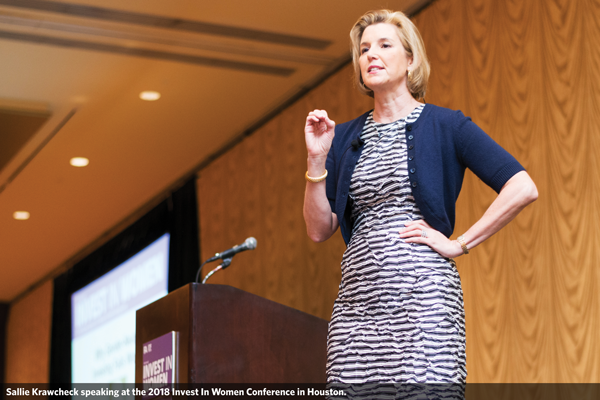 The financial industry is at the bottom of the pile when it comes to accepting, promoting and serving women, said Sallie Krawcheck, founder of Ellevest, a New York-based digital investing platform for women.
The financial industry is at the bottom of the pile when it comes to accepting, promoting and serving women, said Sallie Krawcheck, founder of Ellevest, a New York-based digital investing platform for women.
More women advisors and clients are needed, yet “our industry has a long way to go,” Krawcheck said Tuesday. The industry “has to take a hard look at itself or people like me will start our own companies” to solve the diversity problem, she said.
“The financial industry must help advance and serve women and people of color if it wants to push this country to be a better place,” she said.
She made her remarks Tuesday at the Invest In Women conference sponsored by Financial Advisor and Private Wealth magazines. The conference is being held in Houston.
Krawcheck, who worked her way to the top of some of the biggest financial firms before throwing it all aside to start Ellevest, has gained a reputation as a strong and feisty advocate for women while blazing her own successful career in finance. She started as an equity analyst for Sanford C. Bernstein & Co. and moved up to research director, then to chairwoman and CEO of the sell-side research firm.
She then moved to Citigroup and subsequently Bank of America, where she was the chief of Merrill Lynch Wealth Management. She has amassed an impressive number of honors along the way, being named by Forbes as No. 7 on its list of the World’s 100 Most Powerful Women in 2005. She is also the chairwoman of Ellevate Network (formerly 85 Broads Unlimited), an organization of female professionals that supports other businesswomen.
For most women, however, the financial industry has had a dismal performance on diversity issues. The gender pay gap is closing, but only very slowly, Krawcheck said. At the rate society is moving, it will take women 38 years to reach pay equity, black women will need 110 years and Hispanic women 180 years, she said.
And Krawcheck said the problem will not change until women attack it as a group. “We cannot do it as individuals. We have to do it together.”
The motivation to make those changes, once women unite and demand to be included, has to come from the CEOs and top leadership, she said. When she worked for the big-name firms, she said she tried to get the top management to embrace women and the different sensibilities and ideas they bring to the table. But her proposals fell on deaf ears, which is why she started her own firm.
“What we do at Ellevest is pretty simple. We ask women clients questions they can answer. We do not ask her how much risk she can tolerate, because she does not know. Neither does a man.”
The “Me Too” movement has brought national attention to both sexual harassment, the lower status that women occupy and their lack of power. But it goes back to money.
“The underpinning of the ‘Me Too’ movement is money. Money is power. We will not be fully equal to men until we are financially equal to men,” she said.
When it comes to financial issues, women are infantilized, she said, and yet women are better hedge fund managers than men and better mutual fund managers. Investments controlled by women perform 1 percent better than those controlled by men, which is a huge difference, Krawcheck said.
The entertainment industry has gotten the attention on sexual harassment, but “our own business is the worst,” she declared. “Men are making much more money than women and the power dynamic is off. Men in leadership separate women from each other. If we ask for something as an individual, we do not make a difference. Women coming together make a difference.”
As far as female clients are concerned, they have to be persuaded to invest, she said. Women hold 71 percent of their money in cash, which can cost them $1 million in lost returns over a lifetime.
“The gender investing gap can cost women life-changing amounts of money,” she said.
On all of the diversity issues, “the first step is to talk about it,” Krawcheck urged.